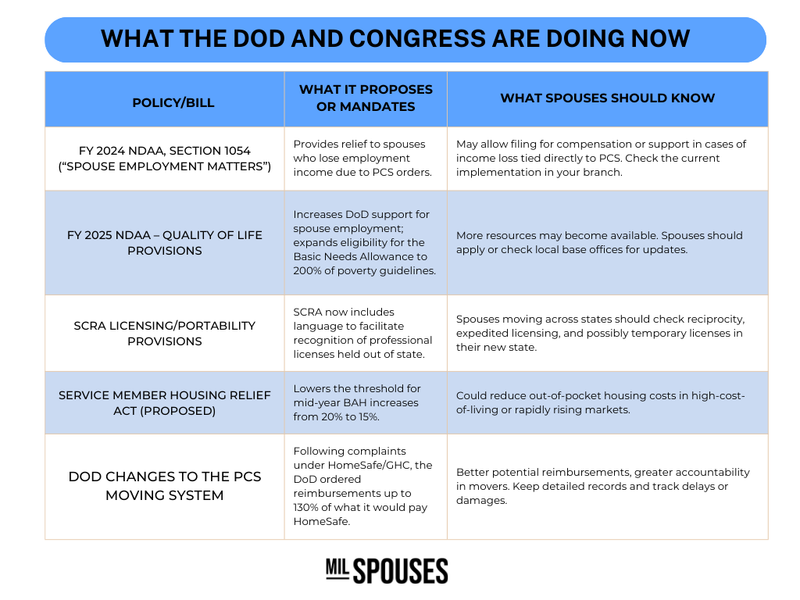PCS ORDERS: FINANCIAL CHALLENGES FOR MILITARY SPOUSES
COMMENT
SHARE

ADVERTISEMENT
Every PCS (Permanent Change of Station) order carries costs beyond moving trucks and orders: spouses pay in lost income, unexpected fees, and delayed reimbursements. When pay or allowances lag behind orders, household stability is at risk. New Congressional bills and Department of Defense (DoD) policy shifts offer hope—if the gaps are closed.
PCS Orders: Financial Impact Data
- U.S. military families lose, on average, $5,000 per PCS move in out-of-pocket costs. Much of that comes from expenses that are not reimbursed or only partially reimbursed.
- Spouses working in licensed professions see substantial income losses: approximately $3,100 in the year of a PCS (around a 14% drop). Those with young children often lose more.
- More than 30% of military spouses are in careers that require a state license or certification. These credentials are rarely transferable automatically when moving states, creating delays and costs.
Nobody Prepared You for Military Life
But we can help. Join over 100k spouses already getting the advice, resources, and military tea they need to thrive.
DFAS Pay Delays and PCS Challenges
- Essential upfront expenses—rent deposits, utility setup, travel, temporary housing—often must be paid long before reimbursements arrive.
- With low savings (many military families report having under $500 in savings), delayed pay can force debt, missed payments, or choosing between essentials.
- Spouse employment is interrupted: licensing delays, job application gaps, and childcare issues all compound when financial resources are tight.
DoD and Congressional Actions on PCS Issues

Military Spouse Support Programs 2023
ADVERTISEMENT
Licensure & Certification Reimbursement
Service branches reimburse up to $1,000 for spouse licensure or credentialing fees and up to $2,000 combined for business-related certification or relicensing costs when PCS requires moving jurisdictions.
Interstate Compacts & Licensing Reciprocity
Many professions (nursing, counseling, teacher mobility, physical therapy, etc.) participate in interstate compacts, which help spouses maintain or transfer licenses more efficiently.
Military Spouse Fellowship & Employment Accelerator Programs
The Army expanded its fellowship program to help spouses gain paid employment opportunities; it also improved awareness and access to licensure reimbursement.
ADVERTISEMENT
Unresolved PCS Financial Challenges
Reimbursement timelines remain slow; when pay or allowances are delayed, there is often no safety net or advance. Some professions and states still do not fully honor licensing reciprocity or temporary licenses, even with federal law (SCRA) and proposed NDAA mandates.
BAH still lags behind actual housing market costs in many areas; spouses often end up paying hundreds out of pocket monthly.
Childcare access and affordability during relocation are still inconsistent. Spouse employment often depends on accessible childcare.
What Military Spouses Can Do Right Now
- If you’re relocating, document every cost: receipts, invoices, contracts. Be ready for claims and hold your mover accountable.
- Check your spouse’s profession: Does your new state recognize licenses from the previous state? Expedited or temporary license options? Use the Department of Labor, DoD, and your state licensing board resources.
- Contact your base’s Financial Readiness Office, Legal Assistance Office, or Military OneSource to find out what reimbursement, advance, or grant options are available.
- Monitor the status of bills (like the Housing Relief Act), NDAA implementation, and SCRA guidance. Advocacy groups like NMFA and MFAN help push for accountability.
- Build a support network locally and online; many spouses share tips for navigating tough PCS seasons.
Financial Burden of PCS Moves on Military Families
PCS moves are inevitable in military life—but financial chaos shouldn’t be. With current policy shifts, bills, and DoD reforms, there’s growing recognition of the burden that spouses carry.
But until reimbursement is timely, licensing is truly portable, and housing costs are matched to reality, many spouses will still be the silent partner paying the hidden price.
Military spouses, you deserve visibility, fairness, and support—not just phrases in law, but real, practical help when PCS orders arrive.
Suggested reads:
Join the Conversation
BY NATALIE OLIVERIO
Veteran & Senior Contributor, Military News at MilSpouses
Natalie Oliverio is a Navy Veteran, journalist, and entrepreneur whose reporting brings clarity, compassion, and credibility to stories that matter most to military families. With more than 100 published articles, she has become a trusted v...
- Navy Veteran
- 100+ published articles
- Veterati Mentor
ADVERTISEMENT
ADVERTISEMENT




